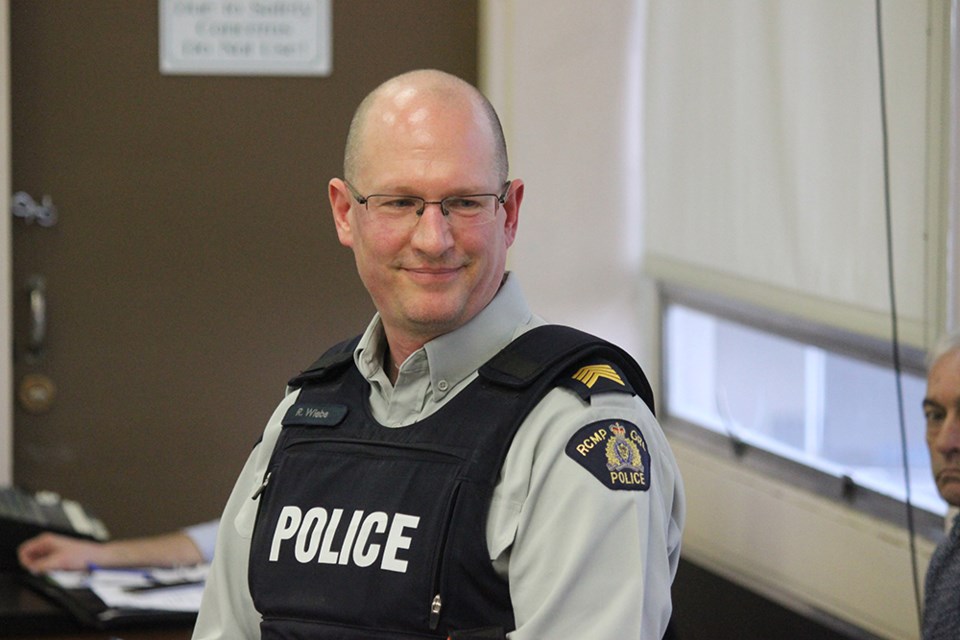City of Powell River councillors are supportive of an initiative calling for easing the burden on police officers enforcing Mental Health Act cases.
At the June 15 committee of the whole meeting, Powell River RCMP staff sergeant Rod Wiebe outlined a letter from City of White Rock, calling on BC municipalities to support two resolutions at the Union of British Columbia Municipalities convention in September. The resolutions call for a mobile crisis response car program, and for invoicing for police officers required to attend at hospitals for mental health patients awaiting admission.
Wiebe said the initiative is not a criticism of hospitals, but rather, his support for the city, as Powell River RCMP’s major contracting partner.
Wiebe said mental health incidents can tie up RCMP members at the hospital for considerable time. He said the RCMP is working with Powell River General Hospital to reduce times officers are spending with mental health patients waiting to be seen by a doctor.
“We continue to make improvements in that area but the wait times can still be up to three to four hours,” said Wiebe. “It takes officers off the road and they are unable to respond to calls for service.”
Wiebe said he was asking councillors to review the letter sent out by White Rock.
“It’s certainly worth a conversation to have,” he added.
He said BC Ambulance Service had significant wait times and devised a plan whereby it would bill back the hospital for wait times in excess of a certain amount of time.
Councillors support initiative
Councillor George Doubt said he likes the idea of a mobile crisis response car program. He said as far as invoicing health authorities for time spent by police officers, he is 100 per cent supportive.
Wiebe said the response car would be a great program to bring to Powell River. He said with limited resources, and a town as small as Powell River compared to the Lower Mainland, it might not work, however.
Councillor Maggie Hathaway said the issue is if someone has to attend the hospital for mental health reasons and they refuse to go, they can be arrested under the Mental Health Act by the police.
“We prefer they go voluntarily but that isn’t always the case,” said Hathaway. “The police pick them up and take them to the hospital. The police cannot leave the care of that individual until they are checked in by a physician.
“You have a person sitting there waiting to see a doctor in the care of a police officer and stigma is attached. It’s not a good use of the police officer’s time and we want to find some way to eliminate that wait time.”
She said how White Rock is starting out is indicating that the health district should be billed for the time.
“I don’t think that’s the best solution, but in the meantime, I would like to have council fully support the motion,” said Hathaway. “Ultimately, we’re paying for that time for an officer just sitting there. It’s province-wide, it’s not just in Powell River.”
Hathaway said the other issue was where someone with social work experience would ride in the car when police went for a wellness check or to arrest someone under the Mental Health Act. She said that person could go with the police and perhaps convince an individual they should go willingly, and stay at the hospital with the person being admitted instead of a police officer.
Councillor Rob Southcott, who used to work for BC Ambulance Service, said more than 20 years ago there was a realization that resources were being sucked up with ambulance paramedics having to monitor patients before they were admitted. The ambulance service started documenting time spent in emergency rooms and sent the provincial government a bill of $10 million in the first year, he added.
“I’ve seen police officers hanging out because the patient has to be admitted in order to transfer the Mental Health Act arrest over,” said Southcott.
Councillor Cindy Elliott said she’s in favour of the resolution because funding for police downtime is coming from city coffers for the most part and the province should be paying.
Wiebe outlines crime statistics
In his appearance before city councillors, Wiebe also outlined crime rate statistics for the city.
“The numbers are trending way down,” said Wiebe.
He said property crime is down 27 per cent, business break and enters are down 76 per cent, residential break and enters are down 28 per cent, theft under $5,000 is down 35 per cent and shoplifting is down 54 per cent. Simple assaults are down 10 per cent. Robberies are up 50 per cent, but went from two in 2019 to three in 2020.
“All in all, the numbers are amazing,” said Wiebe. “I’m not sure what I can attribute it to, but we have taken care of a lot of our prolific offenders. I can’t help but think all the work the city and council is doing with social development is starting to have an impact on our crime statistics.”



